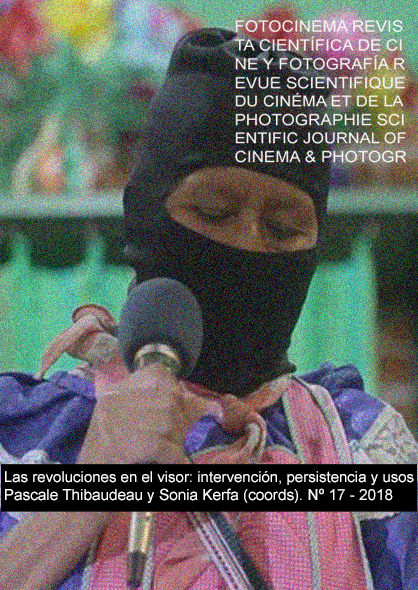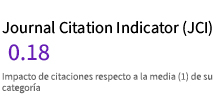The absent revolution. Ghosts and echoes from May 68 in Jean-Luc Godard and Dziga Vertov´s cinema
DOI:
https://doi.org/10.24310/Fotocinema.2018.v0i17.5108Keywords:
Godard, Documentary, Dziga Vertov´s Group, Revolution, May 68.Abstract
How long lasted May 68? A whole month or just a week? Historians do not quite agree on the duration of French May, but neither on its effects, nor even on the real reach of the protest movements and revolutionaries that shook Europe and the US. in the late 60's and early 70's. Franco-Swiss director Jean-Luc Godard, like many of his contemporaries could not, nor wanted, to remain outside the process and together with the group Dziga Vertov would be launched to the realization of a series of unorthodox documentary films that suppose an extraordinary counter-narration of the events that occurred in those important months of the late 60's. The director and his collaborators shied away from a direct and explanatory documentary image, and with prophetic lucidity, preferred to investigate the absent image, always elusive, hidden, through explorations that would have as spearhead complex technical explorations of sound and image montage. The 68 leaves a trail in the documentaries of Godard but also in several of his later productions. It seems that the Franco-Swiss director could no longer escape the image of the revolution, or its ontological and communicative valueDownloads
Metrics
Publication Facts
Reviewer profiles N/A
Author statements
Indexed in
-
—
- Academic society
- N/A
- Publisher
- Universidad de Málaga
References
Baynac, J. (2016). Mayo del 68. La revolución de la revolución. Madrid: Visor Libros.
Beckett, A. (2010). When the lights went out. Britain in the Seventies. Faber&Faber.
Cascajosa, C. (2016). Historia de la televisión. Valencia: Tirant lo Blanch.
Cesiruelo, M. (2014). Jean-Luc, Community, and Communication. En Conley, T.; Jefferson Kline, T. (2014). A Companion to Jean-Luc Godard. Oxford: Wiley-Blackwell.
Comolli, J-L. (2016). Mayo francés. La cámara opaca. El debate cine e ideología. Buenos Aires: El Cuenco de Plata.
Conley, T. y Jefferson Kline, T. (2014). A Companion to Jean-Luc Godard. Oxford: Wiley-Blackwell.
Dahrendorf, R. (1990). El conflicto social moderno. Madrid: Mondadori.
Deleuze, G. y Guattari, F. (1991). What is philosophy? Columbia University Press.
Dubois, Philipe (2004). Cinema, vídeo, Godard. Sao Paulo: Cosac Naify.
Durham, S. (2014). An Accurate Description of What Has Never Occurred. History, Virtuality, and Fiction in Godard. En Conley, T. y Jefferson Kline, T. (eds). A Companion to Jean-Luc Godard. Oxford: Wiley-Blackwell pp. 441-455.
González Ferriz, R. (2017). 1968. Madrid: Debate.
Jones, O. (2012). Chavs. La demonización de la clase obrera. Madrid: Capitán Swing.
Linhart, R. (1978-1981). L´établi. París: Éditions de Minuit.
MacCabe, C. (2015). Godard. Retrato de un artista a los sesenta. Barcelona: Seix Barral.
Pagis, J. (2014). Mai 68, un pavé dans leur histoire. Paris: Presses de Sciences Po.
Thompson, E.P. (2012). La formación de la clase obrera en Inglaterra. Madrid: Capitán Swing. Edición original (1963).
Vinen, R. (2018). 1968. El año en el que el mundo pudo cambiar. Barcelona: Crítica.
Downloads
Additional Files
Published
How to Cite
Issue
Section
License
All contents published in Fotocinema Revista científica de cine y fotografía are protected under the Creative Commons Attribution-NonCommercial-ShareAlike 4.0 International (CC BY-NC-SA 4.0) license. All about this license is available in the following link: <http://creativecommons.org/licenses/by-nc-sa/4.0>
Users can copy, use, redistribute, share and exhibit publicly as long as:
- The original source and authorship of the material are cited (Journal, Publisher and URL of the work).
- It is not used for comercial purposes.
- The existence of the license and its especifications are mentioned.
There are two sets of authors’ rights: moral and property rights. Moral rights are perpetual prerogatives, unrenounceable, not-transferable, unalienable, imprescriptible and inembargable. According to authors’ rights legislation, Fotocinema. Revista científica de cine y fotografía recognizes and respects authors moral rights, as well as the ownership of property rights, which will be transferred to University of Malaga in open access. The property rights are referred to the benefits that are gained by the use or the dissemination of works. Fotocinema. Revista científica de cine y fotografía is published in an open access form and it is exclusively licenced by any means for doing or authorising distribution, dissemination, reproduction, , adaptation, translation or arrangement of works.
Authors are responsable for obtaining the necessary permission to use copyrighted images.














13.png)



